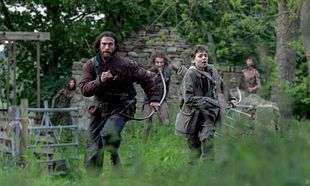Less a plot, more a character study (and the roots of the character at that), Childhood of a Leader explores moments that help form the personality of ten-year-old Prescott (Sweet), a bored American kid forced to live in a war-ravaged chateau with his mother (Bejo) while father (Cunningham) negotiates the surrender of Germany in the weeks after WWI.
Just like his offbeat roles in those unconventional films (Simon Killer, Funny Games US, Force Majeure), Brady Corbet has turned up with something equally as peculiar for his directorial debut: What mitigating factors could turn an innocent child into a despot? He sets his stall out early with dark, hard-to-see scenes and having Scott Walker's, whose music gets more challenging with every album, pummelling score set the tone: This won't be for everyone.
Exploring the same themes as Haneke in The White Ribbon, Corbet (from a script co-written with The Sleepwalker's Mona Fastvold) investigates the possible roots and reasons for future violence and hate. Divided into chapters (The First Tantrum, The Second Tantrum, etc), Prescott is almost Damien Thorn in makeup. Partly angelic, there's a quiet menace in his eyes, like an animal biding its time for an opening to strike. We first see him sing a Christmas hymn before tossing stones at his fellow cast members. Later, a cheeky grab of his maid's (Yolande Moreau) breast is laughed off but the same action (with teacher Stacey Martin) results in a stiff rebuke and a smack on the hand.
But most of the psychological study stems from his treatment at the hands of his parents: cold and distant, their family set up seems to be a professional one, with Prescott an employee that must be trained in the ways of the family business. Trained/broken in. In one act of defiance he locks himself in his room. "We’ll starve him out," his mother, a devout catholic, coldly remarks.
The sombre mood translates to the visuals with Corbet shooting post-war France like a desolate landscape: grey skies and mud and bare trees. There's something in the air, a foreboding impending doom. Cunningham does what he can to persuade fellow diplomats not to cripple Germany but Corbet never goes as far as having his lead say that fascism will spring from the humiliating treaty; he does however draw parallels between Germany of 1919 and the boy: proud, wilful, and for now forced to accept the current situation, Prescott has an eye for the future where freedom will bring a chance for revenge.
Corbet's pacing can lag in places but there's more than enough in Childhood of a Leader to suggest he’s going to be a major director in years to come.


















































































